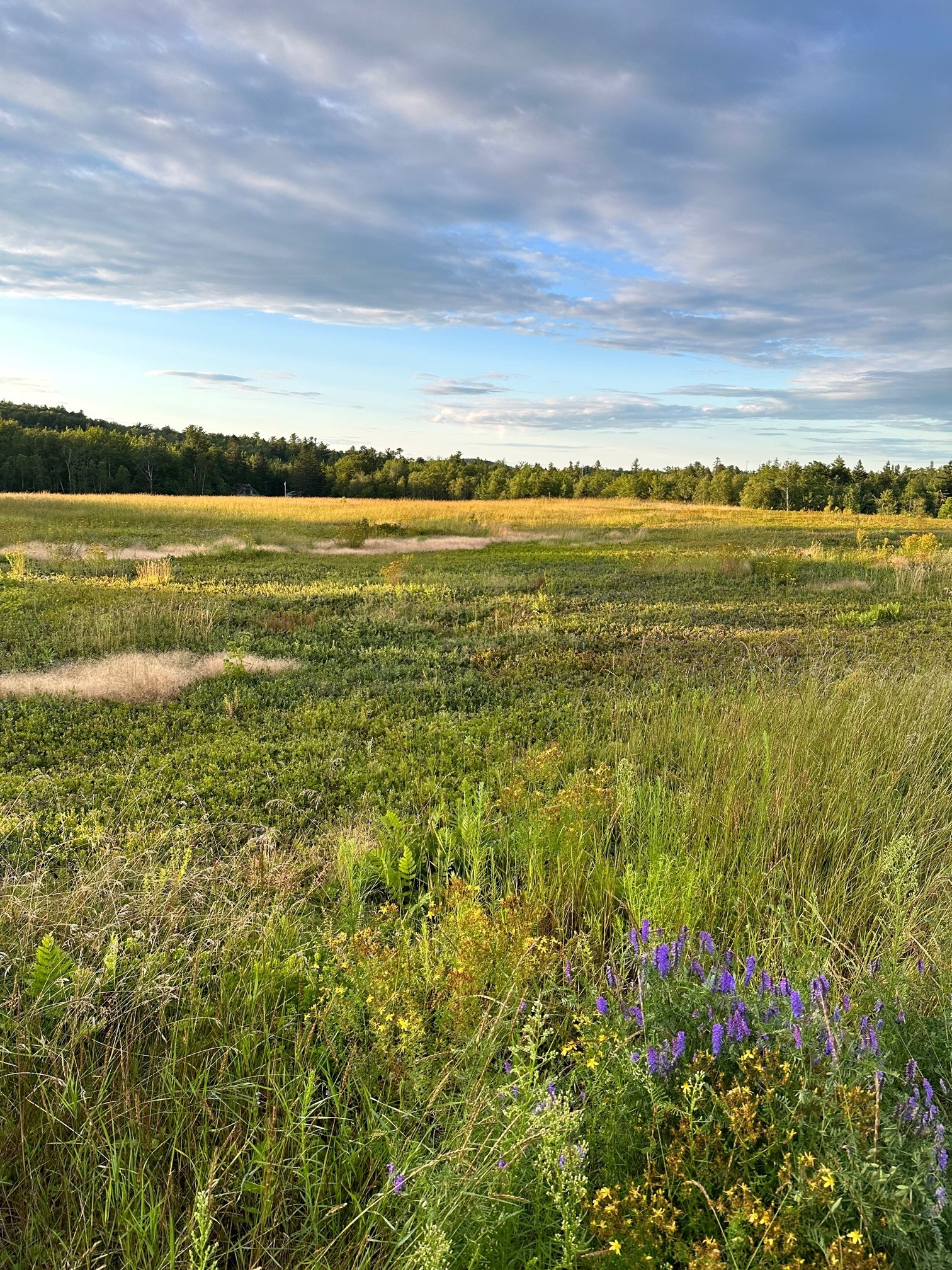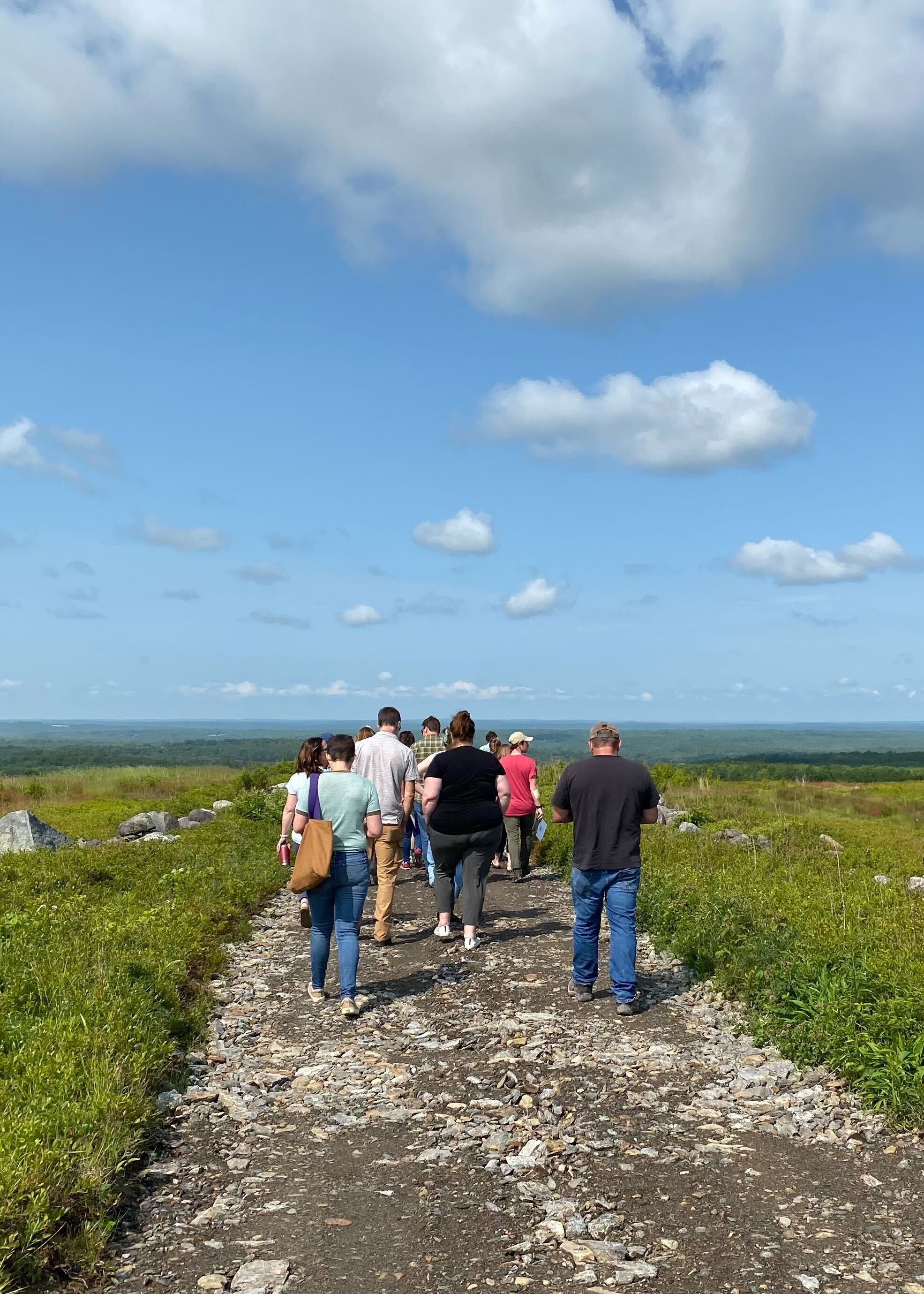
August 3, 2023
|
Kristina Buckley
The first weekend in August marks the start of wild blueberry season in Maine, and we couldn’t be more excited. Now in its third year, Wild Blueberry Weekend is an annual celebration of the long history and traditions of wild blueberries.
On August 5-6, you can find Maine blueberry farmers offering tours and activities, take home freshly-picked pints of berries and other blueberry treats, and find restaurants serving up specialties featuring Maine wild blueberries. Check out the Wild Blueberry Weekend map organized by our friends at the Wild Blueberry Commission of Maine to plan your visit.
The Wabanaki people have been stewarding wild blueberries since time immemorial, and we also encourage you to watch Voices from the Barrens (you may remember the virtual screening we co-hosted a couple years ago!). This documentary follows the Passamaquoddy Tribe as tribal members come from Maine and Canada to harvest wild blueberries each summer. In the face of changes in the wild blueberry industry, the film shows how the Passamaquoddy Wild Blueberry company is working to balance their traditions, participation in the global wild blueberry business, and tribal financial independence.
In honor of Wild Blueberry Weekend, we’re sharing a few of our favorite blueberry stories from farmers in our network this year. Farming economics, farmland protection, and innovation are all key ingredients to a thriving wild blueberry industry. Below, you’ll read about how MFT is partnering with farmers to combine these ingredients into a recipe for success. (And we do mean that literally – don’t miss six of our favorite wild blueberry recipes at the end!)
As you support Maine’s wild blueberry growers this weekend, please consider joining us for Clarry Hill Giving Day on Tuesday, August 8th. Help protect the wild blueberry barrens on this 263-acre property, located in Union and Waldoboro. With generous support from the Ram Island Conservation Fund at the Maine Community Foundation and an anonymous donor, your donation toward this special project will be matched two-for-one.

In early 2022, MFT launched a special Wild Blueberry Cohort of our Business of Farming business planning program to help blueberry growers come together and address the unique challenges they face in this industry. The effects of climate change, market prices, and labor shortages all arose as challenges, and participants discussed innovative strategies to grow their profitability, like incorporating value-added products. Last week we caught up with one of the participants, Tom Michaud of Michaud Farms in Northfield, to hear how things are going a year and a half later.
When asked about this year’s crop, Tom said the rainy weather and late frosts had him nervous about his harvest, but things are starting to turn and he’s seeing blue! Tom says that what he learned in the workshops has continued to have an impact on his operations today. “I found the WBB Business of Farming very valuable. Honestly, I was operating with little to no formal planning – I had some hunches and ideas, and thought I knew what they’d look like on paper. I’ve changed my future plans dramatically since doing the work to actually forecast financial outcomes. Actually putting them on paper was both revealing and educational, and the process was as much fun as the outcome for me. By putting the entire farming operation on paper, I found I was looking at it from a seasonal/one-piece-at-a-time perspective that prevented me from seeing the big picture.
I’m new to farming, and with my limited experience it feels like there’s an inherent element of gambling involved every year, could be the weather that helps or hurts you, or a number of other elements/factors! We prepare as well as we can, and the lessons from Business of Farming helped me find ways to do it more conservatively to help improve the financial outcomes while continuing to grow my farm.”
.jpeg)
Due to the nature of wild blueberries, it is vital that we preserve existing blueberry fields in order to secure the future of Maine’s wild blueberry industry. Once developed or reforested, it is very challenging (and costly) to regain acreage as wild blueberries cannot be re-planted and require years of forest management to bring existing plants into production. With the recent loss of some of this land in Maine, we now have 40,000 acres of these fields left (down from 60,000 not too long ago). This amazing wild crop is a cornerstone of Maine’s farming economy, and it’s important that we keep these existing fields in active agriculture for the sector to thrive, especially those lands that become vulnerable to development as many wild blueberry farmers approach retirement and the industry trends toward consolidation.
Earlier this spring MFT closed on an easement protecting an approximately 17 acre wild blueberry field in Lincolnville. Shana Hanson has a home farm in Belfast called 3 Streams Farm and purchased this blueberry field on the side of Levenseller Mountain in 2018 to start a cooperatively managed U-Pick operation. The blueberry field has been named “Cattail Sky and Field” due to the open views and presence of cattails in a swale down the middle of the field. Prospective berry pickers can receive work trade credit or pay by volume. Shana also brings her goats to graze amongst the blueberries and has plans for tree fodder management on the property. With scenic views towards Tilden Pond and the surrounding hillsides from the top of the blueberry field, this farmland is now protected from potential development, keeping its barrens available to feed both humans and livestock alike! Read more about the blueberry cooperative here.

Clarry Hill, located in Union and Waldoboro, Maine, is a 263-acre parcel consisting of about 70% wild blueberry barrens. When the property recently went up for sale, it generated immediate interest from non-agricultural buyers. You can understand why when you view this recent drone footage of Clarry Hill! In mid-September, MFT will purchase an agricultural easement on Clarry Hill, protecting it for agricultural use and sustaining the Midcoast’s blueberry growing tradition. Midcoast Conservancy will acquire the property in a parallel effort to protect it. To rally support for this special project, on Tuesday, August 8th, MFT will host a Clarry Hill Giving Day, with all donations matched 2-for-1 up to $50,000, thanks to generous support from the Ram Island Conservation Fund at the Maine Community Foundation and an anonymous donor.
Recently members of the MFT staff and some of our friends from Midcoast Conservancy had the chance to visit Clarry Hill and get the scoop on Maine’s wild blueberry industry from Executive Director of the Wild Blueberry Commission of Maine, Eric Venturini, along with area blueberry farmers Paul Sweetland, who has farmed Clarry Hill for decades, and Jake Boyington, who runs Ridge Road Blueberries in Appleton.
Highlighting the need to keep Maine’s wild blueberry lands in active agriculture and bring in newer generations of farmers, Eric, Paul, and Jake also spoke with us about challenges the industry faces including potential loss of crop due to drought or disease, and increasing production costs despite static commercial prices. We learned more about many farmers’ decisions to move over to a mechanized harvesting system to cut down on production costs, time, and carbon emissions. We also learned about innovative research to help farmers make informed decisions about pest management and adopt newer drought resilience strategies.
We can help keep Maine’s wild blueberry industry thriving by protecting wild blueberry lands like Clarry Hill and Cattail Sky and Field, supporting wild blueberry farm businesses like Michaud Farm to grow their financial sustainability, and encouraging research and innovative solutions to support wild blueberry growers.
Farming economics, farmland protection, and innovation are all key ingredients to a thriving wild blueberry industry – and when they’re combined, the rewards are sweet. Read on for some of our favorite recipes to help you make the most of the pints you pick up this weekend as you support Maine’s wild blueberry farmers.
%2520crop.jpeg)
From grabbing handfuls of blueberries straight from the bush, to spending hours perfecting the perfect blueberry jam, there are so many ways to enjoy Maine’s blueberry bounty!
Sign up for our monthly email newsletter.